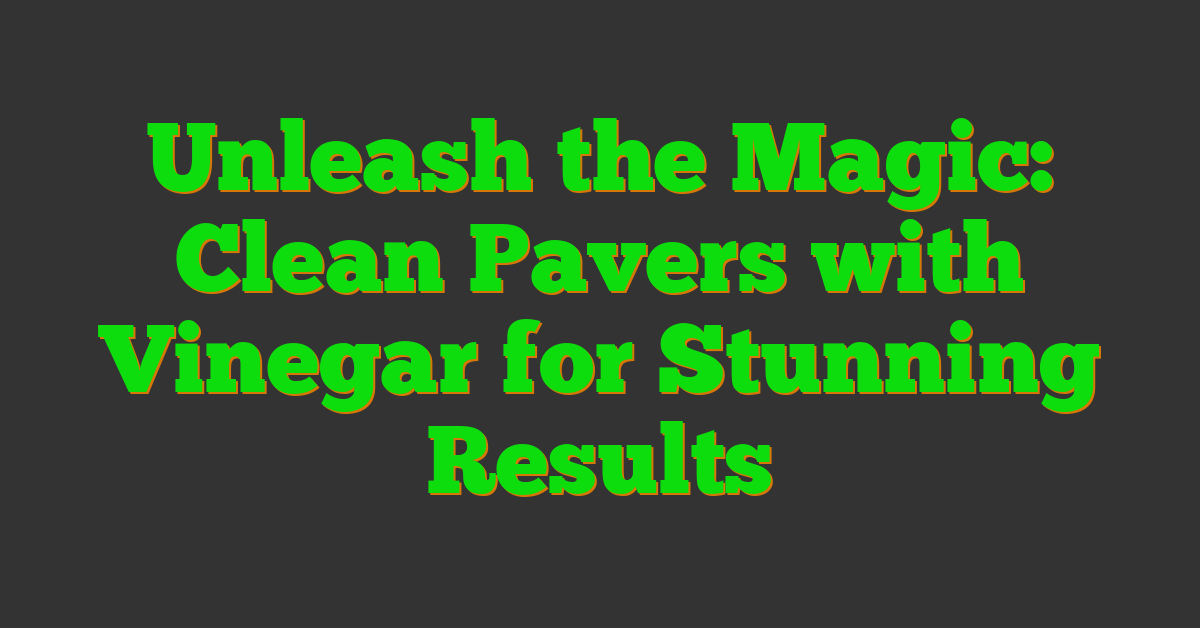Thinking about sprucing up your outdoor space? We’ve all been there! When it comes to cleaning pavers, the solution might be simpler than you think. Have you ever considered using vinegar as a natural cleaning alternative? It’s a game-changer!

In our upcoming article, we’ll explore the wonders of cleaning pavers with vinegar. From its eco-friendly properties to its effectiveness in removing stubborn stains, vinegar could be the secret weapon your patio has been waiting for.
Join us as we delve into the world of DIY paver cleaning solutions and discover how this common household item can transform your outdoor oasis.
The Effectiveness of Vinegar for Cleaning Pavers
Understanding Acetic Acid in Vinegar
When it comes to cleaning pavers, understanding the power of acetic acid in vinegar is crucial. Vinegar, a common household item, contains acetic acid, a natural cleaning agent. This acid gives vinegar its cleaning properties, making it effective in breaking down stains and grime on pavers.
Comparing Vinegar to Commercial Cleaners
In our experience as landscape designers, we have found that comparing vinegar to commercial cleaners is essential when choosing the right cleaning solution for pavers. While commercial cleaners can contain harsh chemicals that may harm the environment or pose risks to pets and children, vinegar offers a safer and eco-friendly alternative. When looking at effectiveness, vinegar can be just as efficient in cleaning pavers as some commercial cleaners, making it a versatile and sustainable option for outdoor cleaning tasks.
Preparation Before Cleaning Pavers with Vinegar
Safety Measures and Protective Gear
When it comes to preparing for cleaning pavers with vinegar, safety is our top priority. Before we start the cleaning process, it’s essential to ensure that we have the necessary protective gear. This includes wearing gloves to protect our hands from direct contact with the vinegar solution. Additionally, we recommend wearing safety goggles to prevent any splashes from reaching our eyes. Ensuring proper ventilation in the outdoor area where we’ll be working is also crucial to avoid inhaling vinegar fumes. By taking these safety precautions, we can carry out the cleaning process comfortably and securely.
Creating Your Vinegar Cleaning Solution
To begin cleaning pavers with vinegar, we need to create an effective cleaning solution. The primary ingredient for this solution is white vinegar, which is readily available in most households. We recommend using a mixture of equal parts water and vinegar to create a potent yet safe cleaning solution. For example, mix one cup of water with one cup of vinegar in a spray bottle for easy application. This simple solution can effectively break down dirt, grime, and even mold on the pavers without the need for harsh chemicals. Once we have our vinegar cleaning solution ready, we are well-prepared to enhance the look of our outdoor spaces with eco-friendly and sustainable cleaning methods.
Step-by-Step Guide to Cleaning Pavers with Vinegar
Removing Debris and Initial Wash
When cleaning pavers with vinegar, our first step is always to ensure that we remove any debris or loose dirt from the surface. This can be done by using a broom or a leaf blower to sweep away leaves, twigs, and other loose particles. Once the surface is clear, we proceed with an initial wash using a garden hose to wet the pavers thoroughly.
Applying Vinegar Solution to Pavers
After the initial wash, it’s time to apply the vinegar solution to the pavers. We recommend using a mixture of equal parts water and vinegar in a spray bottle for easy application. Starting from one end, we spray the solution generously over the pavers, ensuring complete coverage. Vinegar, known for its acidic properties, helps in breaking down tough stains and grime without causing harm to the environment.
Scrubbing and Rinsing Techniques
To ensure a thorough clean, scrubbing the pavers is essential. We use a stiff-bristled brush to scrub the surface vigorously, focusing on areas with stubborn stains. After scrubbing, we rinse off the vinegar solution using a garden hose or a pressure washer. It’s crucial to rinse the pavers thoroughly to remove any remaining vinegar residue and dirt, leaving behind a clean and refreshed look to your outdoor space.
By following these simple steps, you can effectively clean your pavers with vinegar, maintaining their beauty and durability while embracing a sustainable and eco-friendly cleaning approach.
Benefits of Using Vinegar on Pavers
The Eco-Friendly Choice
When considering cleaning options for pavers, using vinegar is our top choice as landscape designers. It’s a fantastic eco-friendly alternative that aligns with our commitment to sustainable practices. Vinegar is a natural product that is biodegradable, non-toxic, and safe for both humans and the environment. By opting for vinegar, we can effectively clean pavers without introducing harmful chemicals into the outdoor space. This choice not only benefits the immediate surroundings but also contributes to a greener future for all.
Cost-Effective Cleaning Solution
As landscape designers, we understand the importance of cost-effective solutions that deliver results. Cleaning pavers with vinegar is a budget-friendly option that doesn’t compromise on quality. Vinegar is a pantry staple that is readily available at a low cost, making it an economical choice for maintaining outdoor spaces. By using vinegar on pavers, we can achieve a thorough clean without breaking the bank. This approach allows us to meet our clients’ needs for effective cleaning solutions that are both affordable and efficient.
Potential Drawbacks and Considerations
Risks of Vinegar on Different Paver Materials
When it comes to considering the use of vinegar for cleaning pavers, we must also be mindful of the potential risks it poses to different types of paver materials. While vinegar is a natural and eco-friendly cleaning solution, its acidic nature may not be suitable for all paver surfaces.
- Concrete Pavers: Vinegar can be effective in cleaning concrete pavers; however, frequent use may cause etching on the surface, particularly if the vinegar solution is too strong. This can lead to a dull appearance and compromise the integrity of the pavers over time.
- Natural Stone Pavers: Natural stone pavers, such as limestone or marble, are more sensitive to acidic substances like vinegar. Using vinegar on these pavers can result in discoloration or damage to the surface, affecting the overall aesthetic appeal of the outdoor space.
- Brick Pavers: While vinegar can serve as a decent cleaner for brick pavers, excessive use may wear down the protective sealant on the bricks, making them more susceptible to staining and erosion from environmental elements.
Considering the specific type of paver material is crucial to avoid any potential harm or deterioration caused by vinegar cleaning solutions. Regular maintenance and spot testing in inconspicuous areas can help assess the compatibility of vinegar with the paver surface without causing irreversible damage.
Weather and Timing for Optimal Results
In our experience as landscape designers, we’ve found that the weather conditions and timing play a significant role in achieving optimal results when cleaning pavers with vinegar. To make the most of this eco-friendly cleaning method, we recommend the following considerations:
- Avoid High Temperatures: Cleaning pavers with vinegar is best done during moderate temperatures. High heat can cause the vinegar solution to evaporate quickly, reducing its cleaning effectiveness. Additionally, direct sunlight on the pavers may lead to streaking or residue left behind after cleaning.
- Dry Weather: It’s ideal to clean pavers with vinegar when the weather forecast indicates a period of dry weather. Rain shortly after cleaning can dilute the vinegar solution, affecting its cleaning power and potentially requiring reapplication to achieve desired results.
- Timing of Cleaning: Optimal timing for cleaning pavers with vinegar is during the early morning or late afternoon when the sun’s intensity is lower. This helps prevent rapid evaporation of the cleaning solution and allows it enough time to break down dirt, stains, and organic growth on the pavers effectively.
By considering the risks associated with different paver materials and selecting the right weather conditions and timing for cleaning, we can harness the benefits of vinegar as a natural cleaning alternative while preserving the integrity and longevity of the pavers in outdoor spaces.
Maintenance Tips to Keep Pavers Clean Longer
Regular Cleaning Schedules
As landscape designers, we recommend incorporating regular cleaning schedules to maintain the cleanliness and appearance of pavers over time. By establishing a routine for cleaning, we can prevent the build-up of dirt, grime, and stains on the pavers, keeping them looking fresh and appealing.
It’s essential to sweep the pavers regularly to remove debris and prevent it from settling into the crevices. A simple broom or brush can do wonders in keeping the pavers free from dirt and dust, enhancing their longevity and preserving their aesthetic appeal.
« Unlock the Mystery: Discover the Hidden Gem of Pavers Shoe Shop Location Unveiling the Ultimate Secrets of Perfect Paving: Step-by-Step Guide »
In addition to sweeping, we suggest washing the pavers with a mild soap solution and water every few weeks to remove any stubborn stains or marks. Mild detergents can help break down grease or oil residues, ensuring that the pavers remain clean and attractive for longer periods.
Preventative Measures and Sealants
To protect pavers from stains, discoloration, and wear, we recommend applying a high-quality sealant. Sealants create a protective barrier on the surface of the pavers, preventing liquids, dirt, and other contaminants from penetrating the material and causing damage.
Before sealing the pavers, it’s crucial to ensure that they are clean and dry to allow the sealant to adhere effectively. Applying a sealant not only enhances the pavers’ appearance but also makes them more resistant to stains, fading, and weathering, thus extending their lifespan.
Regularly inspecting the pavers for damage or signs of wear and tear is also essential in maintaining their longevity. By addressing any issues promptly, such as cracks, chips, or loose pavers, we can prevent further deterioration and ensure that the outdoor space retains its elegance and functionality.
Conclusion
Using vinegar to clean pavers is a fantastic eco-friendly option that offers effective results without harming the environment. We’ve explored the benefits of vinegar as a natural cleaning solution for various paver materials, emphasizing its affordability and biodegradability. While vinegar can be a great ally in maintaining clean and vibrant pavers, it’s crucial to be aware of potential risks like etching and discoloration based on the type of pavers you have. By following our maintenance tips and incorporating regular cleaning routines, you can ensure that your pavers stay looking fresh and well-maintained for a long time. Remember, a little care and attention can go a long way in preserving the beauty and longevity of your outdoor spaces.











